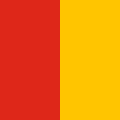Flag of Vatican City
 Flag of Vatican City, version since 2023 | |
| Use | National flag |
|---|---|
| Adopted | 7 June 1929 |
| Design | A vertical bicolour of yellow and white, charged with the coat of arms centred on the white portion |
 |
| This article is part of a series on |
| Vatican City |
|---|
The national flag of Vatican City was adopted in 1929, the year Pope Pius XI signed the Lateran Treaty with Italy, creating the new independent state of Vatican City.
The flag is a vertical bicolour of yellow and white, with the white half charged with the coat of arms of Vatican City (a papal tiara and the crossed keys of Saint Peter). It was modeled after the 1808 flag of the Papal States, a yellow-and-white bicolour defaced with the tiara and keys in the centre. It is one of only two national flags that use a 1:1 aspect ratio, along with the flag of Switzerland.[1]
The flag of Vatican City is also referred as flag of the Holy See.[2] The Holy See, which governs Vatican City, has ecclesiastical jurisdiction over the worldwide Catholic Church. As a result, the flag is also a symbol of Catholic faith or identity, and is sometimes displayed at Catholic churches.[3][4][5][6]
Description
[edit]The 2023 Fundamental Law of Vatican City State states: "The flag of the Vatican City State is made up of two vertically divided sides, one yellow adhering to the hoist and the other white, and in the latter carries the tiara with the keys, all according to the model on Annex A of this Law".[7]
Regulations
[edit]Current regulations
[edit]The flag is described in Article 23 of the 2023 Fundamental Law of Vatican City State, with a visual model appended as Attachment A.[7]
Previous regulations
[edit]The flag is described in Article 19 of the 1929 Fundamental Law of Vatican City State, with a visual model appended as Attachment A.[8]
The flag is also described in Article 20 of the 2000 Fundamental Law of Vatican City State, with a visual model appended as Attachment A.[9][10] The 2000 Fundamental Law of Vatican City State's Attachment A, shows a square flag.[10]
In 2010, the Apostolic Nunciature to Germany stated that the flag does not have to be square.[11]
History
[edit]
Before 1808, the Papal States commonly used a bicolor, yellow-red flag, which was derived from the colours of the Holy See's coat of arms, as well as being the two tradional colours of the Senate and the Roman people.[12][13] In 1798, Napoleon established the Roman Republic, which introduced a black, white, and red flag; after the Papal rule was restored, Pope Pius VII restored the Papal cockade, which was described as red and yellow.[14]
In 1808, Pope Pius VII ordered the Vatican's Noble Guard and other troops to replace red color with white, in order to distinguish them from the troops that had been incorporated into Napoleon's army.[15]
In 1803, the Papal States started using a white merchant flag with the Papal coat of arms in the centre. This flag was made official on 7 June 1815. On 17 September 1825, it was replaced with a yellow and white flag which took its colours from the materials of the two keys (yellow for gold, white for silver). These colors were probably taken from the 1808 flag of the Palatine guard.[16] This was the first bicolour used by the Papal States and the ancestor of the modern flag of Vatican City.[17] The merchant flag also served as a state flag on land.[16]
Starting in 1831, the papal infantry flew square yellow and white flags. At first, they were diagonally divided, but after 1849 they were vertically divided like the merchant flag. The last infantry colour, adopted in 1862, was a plain square white and yellow flag.[17]
On 8 February 1849, while Pope Pius IX was in exile in Gaeta, a Roman Republic was declared. The new government's flag was the Italian tricolor with the motto "Dio e Popolo" on the central stripe. The papal government and its flags were restored on 2 July 1849. On 20 September 1870, the Papal States were conquered by Italy.
After the Lateran Treaty was signed in 1929, papal authorities decided to use the 1825–1870 merchant flag as the state flag of the soon to be independent Vatican City state.[18] The treaty came into effect on 7 June 1929.
Previous versions
[edit]-
 Flag of the Papal States that flew over Porta Pia during the fall of Rome in 1870
Flag of the Papal States that flew over Porta Pia during the fall of Rome in 1870
Raising of the flag at the United Nations
[edit]Since September 2015, the United Nations headquarters has begun displaying the flags of UN observer states alongside the 193 member state flags. On September 25, 2015, the flag of the Holy See was raised for the first time at the UN headquarters.[19][20]
Incorrect version
[edit]An incorrect version of the flag has been commonly used. In this version, the visible inner lining of the papal tiara is colored red instead of white, and a different shade of yellow or gold is used in some portions of the coat of arms. This was used as Wikimedia Commons' version of the Vatican flag between 2006 and 2007 and between 2017 and 2022, and has since become widespread on the Internet.[21]
Controversies
[edit]During Pope Francis's 2018 visit to Ireland, the South Dublin County Council refused to fly the Vatican flag; a local petrol station began to fly the flag in response.[22][23]
A Police Scotland list of flags which could be a criminal offence to display "in a threatening manner" included the Vatican flag; sectarianism is common in Scotland, especially in Glasgow, and the Vatican flag could supposedly be flown as a sign of Catholic identity to intimidate Protestant neighbours.[24][25][26]
See also
[edit]- Coat of arms of Vatican City
- List of flags of the Papacy
- History of Christian flags
- Christian Flag
- Index of Vatican City-related articles
References
[edit]- ^ "Flag of the Vatican City". flaginstitute.org. Retrieved 2024-05-08.
- ^ "United Nations to Raise Holy See Flag on September 25". En.radiovaticana.va. Archived from the original on 2015-09-24. Retrieved 2015-10-20.
- ^ CNA. "Wikipedia had the wrong Vatican City flag for years. Now incorrect flags are everywhere". Catholic News Agency. Retrieved 2024-05-22.
- ^ CNA. "American flag in the sanctuary". Catholic News Agency. Retrieved 2024-05-22.
- ^ "The Vatican Flag". St. Cletus Catholic Church. 13 January 2023.
- ^ "The Flag of Vatican City". mnflag.tripod.com. Retrieved 2024-05-22.
Roman Catholics throughout the world often use the Vatican flag to express Catholic identity at churches, educational institutions, and other establishments.
- ^ a b "Legge Fondamentale dello Stato della Città del Vaticano (13 maggio 2023) | Francesco". www.vatican.va. Archived from the original on 2023-05-27. Retrieved 2023-05-24.
- ^ "[two sections]" (PDF). Acta Apostolicae Sedis. Supplemento per le leggi e disposizioni dello stato della città del Vaticano: 5, 35. 1929 – via Vaticanstate.va.
- ^ "Legge fondamentale dello Stato della Città del Vaticano – 26 novembre 2000". www.vatican.va. Archived from the original on 2023-05-15. Retrieved 2023-05-24.
- ^ a b "STATE OF VATICAN CITY, Flag, Coat of Arms and Seal". Holy See Press Office. 2013-09-06. Archived from the original on 16 May 2023. Retrieved 2023-05-06.
- ^ "letter from the German nunciature (2010-05-27)" (PDF) (in German). Archived (PDF) from the original on 2021-12-05. Retrieved 2021-09-26.
- ^ "Storia della Bandiera dello Stato della Città del Vaticano". vatican.va (in Italian). 31 December 2000.
Anticamente la bandiera dello Stato pontificio era giallorossa (o per meglio dire amaranto e rossa, colori derivati dai colori dello stemma della Santa Sede), i due colori tradizionali del Senato e del Popolo romano, che vennero tuttavia sostituiti con il bianco e il giallo nel 1808.
- ^ Helssen, Tim (15 October 2023). "Vatikanexperte erläutert die Papstfarben Gelb und Weiß: Der Schlüssel zur Farbgebung". Domradio (in German).
Rom, aber auch die Päpste hatten oft goldene Darstellungen auf rotem Grund in ihren Wappenfahnen. Daher entstand im Herrschaftsgebiet des Papstes so eine Kokarde in den Farben Gelb und Rot.
- ^ Becker, William M. (2018). "1: Toward the Modern Papal Colors (1800–1825)". Vatican Flags: Keys and Crowns Since 1800. North American Vexillological Association. p. 22. ISBN 978-0974772875.
- ^ "Bandiera pontificia" (in Italian). Stato della cità del Vaticano. Archived from the original on 2008-10-15. Retrieved 2008-07-09.
Anticamente la bandiera dello Stato pontificio era giallorossa (o per meglio dire amaranto e rossa, colori derivati dai colori dello stemma della Santa Sede), i due colori tradizionali del Senato e del Popolo romano, che vennero tuttavia sostituiti con il bianco e il giallo nel 1808, allorché Pio VII
- ^ a b Breschi, Roberto. "Stato Pontifico" (in Italian). Archived from the original on 23 September 2015. Retrieved 9 February 2014.
- ^ a b Becker, Rev. William M. "Flag of Vatican City". Archived from the original on 6 January 2016. Retrieved 9 February 2014.
- ^ Becker, Rev. William M. (Jan–Mar 2012). "The Vatican Flag: Proportions & Alternatives" (PDF). NAVA News. Trenton, New Jersey: North American Vexillological Association. Archived from the original (PDF) on 6 June 2021. Retrieved 9 February 2014.
- ^ Nations, United. "UN at a glance". United Nations. Archived from the original on 2024-09-30. Retrieved 2024-09-30.
- ^ "Flags of Holy See, Palestine Fly at UN Headquarters". UN.org. 2015-10-01. Archived from the original on 2024-09-30.
- ^ McKeown, Jonah (8 April 2023). "Wikipedia had the wrong Vatican City flag for years. Now incorrect flags are everywhere". Catholic News Agency. Archived from the original on 2023-04-11. Retrieved 2023-04-12.
- ^ Neylon, Laoise (21 July 2018). "Flagging support for Vatican". Archived from the original on 2021-12-23. Retrieved 2021-12-23 – via www.thetimes.co.uk.
- ^ Finn, Christina (28 July 2018). "South Dublin Council won't be flying the Vatican flag, but this Texaco is". TheJournal.ie. Archived from the original on 2021-12-23. Retrieved 2021-12-23.
- ^ "Beware the pernicious Catholicism that is presently abroad in the land | Kevin McKenna". the Guardian. October 21, 2018. Archived from the original on December 23, 2021. Retrieved December 23, 2021.
- ^ "In Scotland, flying the Vatican flag 'provocatively' could be criminal". Catholic News Agency. Archived from the original on 2021-12-23. Retrieved 2021-12-23.
- ^ "Flying Vatican flag in a 'provocative manner' could be a criminal act, say Scottish police". October 3, 2018. Archived from the original on December 23, 2021. Retrieved December 23, 2021.
Further reading
[edit]- Flag of Vatican City by Rev. William M. Becker
- Becker, William M. (2018). "Vatican Flags: Keys and Crowns Since 1800". Raven. 28. North American Vexillological Association.
- "Storia della Bandiera dello Stato della Città del Vaticano". vatican.va. Retrieved 2023-05-24.











